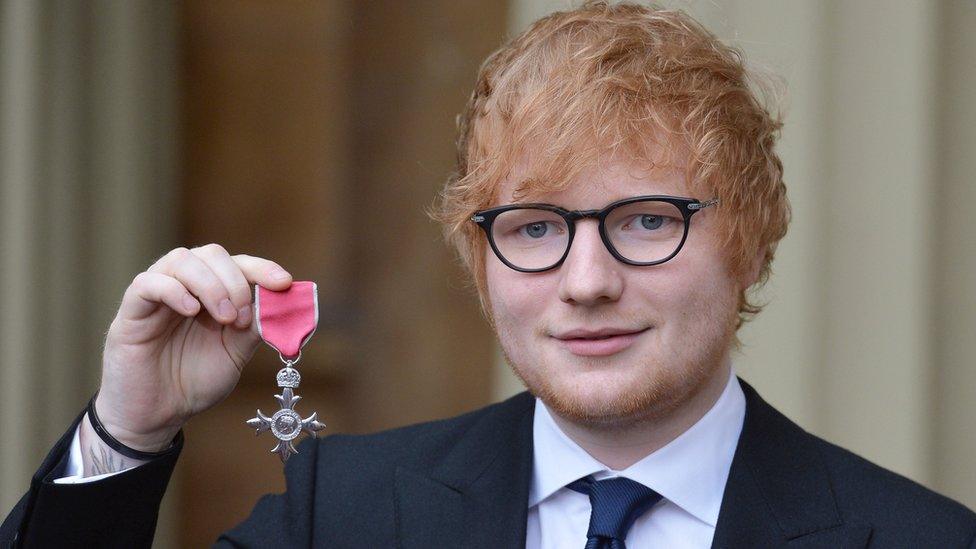The Queen's Honour List: Campaign to stop using Empire in honorary titles
- Published
- comments

A campaign is asking the government to replace the word "Empire" with "Excellence" for those who receive an honour from the Queen.
The Queen's Birthday Honours List recognises people for their amazing achievements or service to the country. The most common honours are OBE (Officer of the Order of the British Empire) and MBE (Member of the Order of the British Empire).
The campaign is asking to replace the word Empire because of its links to Britain's colonial history.
An empire is a group of countries ruled over by a single monarch or ruling power.
The British Empire was made up of Britain, the 'mother country' and the colonies, countries ruled to some degree by and from Britain.
Why do they want the honour changed?
Nearly 100 public figures from charities and civil society who have previously been recognised, are asking for the honours to be renamed so that it becomes an "inclusive source of recognition, celebration and patriotism".
Organisers say that the campaign is about recognising Britain's colonial imperialist past and "acknowledging the harm and trauma it caused".
Medals like this one are traditionally given out to British citizens for outstanding work and service
Why is the British Empire seen as an issue?
Britain used to rule loads of different countries around the world in what was called the British Empire.
At the time some people argued that the Empire was a result of Britain's superiority and that it brought formal systems of government, education and infrastructure, like railways, to these countries.
But many modern historians argue that it is unacceptable to say that colonialised peoples did not have, or would not have developed, their own forms of government, education and infrastructures without the influence of the British Empire.
Many historians also think that you can't look at the British Empire without examining the more shameful aspects of Britain's past.
During this time Britain was heavily involved with the Transatlantic slave trade. The Empire took over many countries, stripping them of their land and cultures which had a negative impact on people living there.
In 1917 the Queen's grandfather, George V, developed a new order called the order of the British Empire.
This was a way to reward men and women for their contributions during WW1.
Now the Order of the British Empire honours service to lots of areas from acting to charity work.
The government now looks after selecting honours recipients.
Anyone can recommend someone to receive an honour from the list below:
Companion of Honour
CBE - Commander of the Order of the British Empire
OBE - Officer of the Order of the British Empire
MBE - Member of the Order of the British Empire
BEM - British Empire Medal
Who has turned down receiving the award?
George the Poet turned down his MBE
Some celebrities and members of the public who were due to receive an award have turned them down in the past.
Poet Benjamin Zephaniah turned down his OBE in 2006 because of its association with the empire and its history of slavery.
George the Poet, the spoken word artist, turned down his MBE because of what he called the "pure evil" of the British Empire. He added the "colonial trauma inflicted on the children of Africa" meant he could not accept it.
Organisers are asking new recipients, who will be announced on Friday as part of the Queen's Birthday Honours List, to support their campaign.
Poppy Jaman, one of the campaign's founders, who was made an OBE in 2018 for her services to people with mental health issues said: "References to the British Empire in romantic or nostalgic terms are offensive and deeply hurtful, particularly to those whose families and ancestors suffered."
"Furthermore, using 'empire' within a national system for honouring integrity, achievement and excellence, is not right for our country anymore," Poppy added.
A change from Empire to Excellence does not require anyone to change the letters after their name. The act of this small change sends a powerful message that we as a nation are growing, we are inclusive, and we embrace change for good.
What has the government said?
The Cabinet Office spokesperson said: "There has been considerable reform to the Honours System in the last 25 years to ensure it is inclusive. There are no plans to change the name of the Order.
"We are delighted to see significant improvements in the diversity of the honours system, with 15 percent of awards going to people from black and minority ethnic groups in the most recent list.
"We will continue to work to further improve diversity in the system, including by working with communities who are under-represented in successive honours lists to encourage nominations."
- Published17 June 2023
- Published10 October 2020
